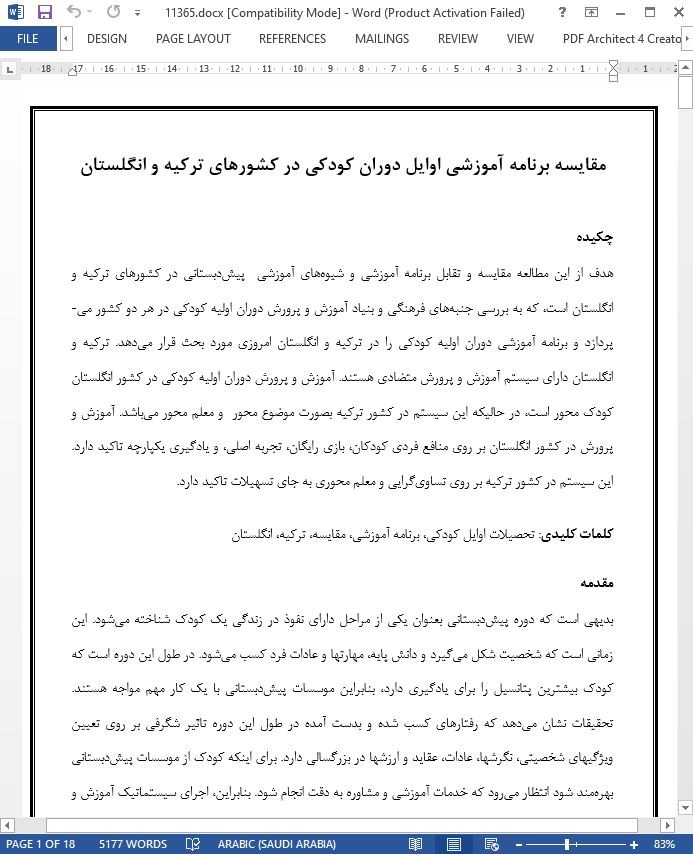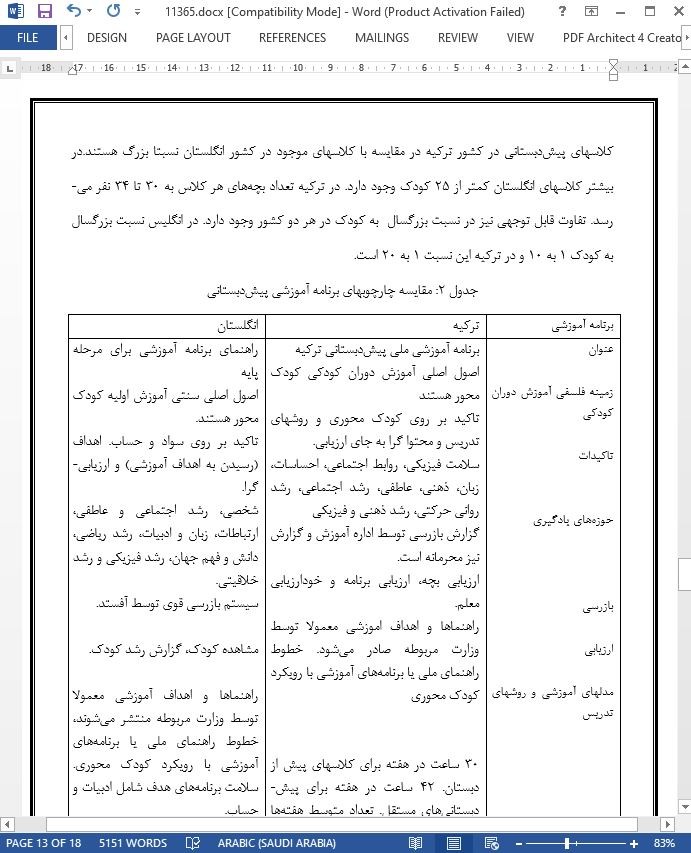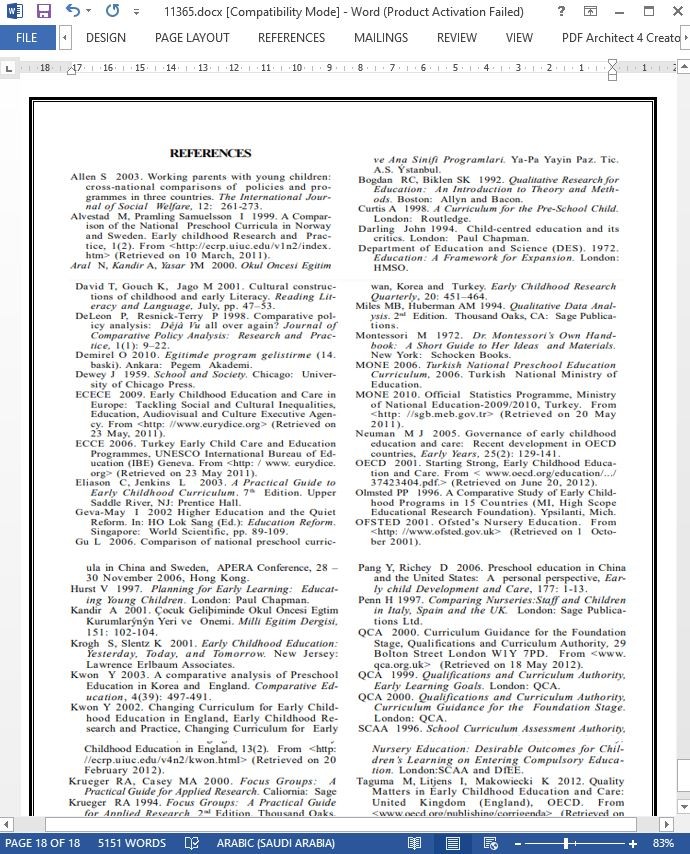
مقایسه برنامه آموزشی اوایل دوران کودکی در کشورهای ترکیه و انگلستان
چکیده
هدف از این مطالعه مقایسه و تقابل برنامه آموزشی و شیوه های آموزشی پیش دبستانی در کشورهای ترکیه و انگلستان است، که به بررسی جنبه های فرهنگی و بنیاد آموزش و پرورش دوران اولیه کودکی در هر دو کشور می-پردازد و برنامه آموزشی دوران اولیه کودکی را در ترکیه و انگلستان امروزی مورد بحث قرار می دهد. ترکیه و انگلستان دارای سیستم آموزش و پرورش متضادی هستند. آموزش و پرورش دوران اولیه کودکی در کشور انگلستان کودک محور است، در حالیکه این سیستم در کشور ترکیه بصورت موضوع محور و معلم محور می باشد. آموزش و پرورش در کشور انگلستان بر روی منافع فردی کودکان، بازی رایگان، تجربه اصلی، و یادگیری یکپارچه تاکید دارد. این سیستم در کشور ترکیه بر روی تساوی گرایی و معلم محوری به جای تسهیلات تاکید دارد.
مقدمه
بدیهی است که دوره پیش دبستانی بعنوان یکی از مراحل دارای نفوذ در زندگی یک کودک شناخته می شود. این زمانی است که شخصیت شکل می گیرد و دانش پایه، مهارتها و عادات فرد کسب می شود. در طول این دوره است که کودک بیشترین پتانسیل را برای یادگیری دارد، بنابراین موسسات پیش دبستانی با یک کار مهم مواجه هستند. تحقیقات نشان می دهد که رفتارهای کسب شده و بدست آمده در طول این دوره تاثیر شگرفی بر روی تعیین ویژگیهای شخصیتی، نگرشها، عادات، عقاید و ارزشها در بزرگسالی دارد. برای اینکه کودک از موسسات پیش-دبستانی بهره مند شود انتظار می رود که خدمات آموزشی و مشاوره به دقت انجام شود. بنابراین، اجرای سیستماتیک آموزش و برآورده ساختن نیازهای رشد و نمو کودکان باید با دقت در برنامه آموزشی طراحی شود.
نتیجه گیری
این مطالعه نشان می دهد که چگونه آموزش دوران کودکی دو کشور تحت تاثیر زمینه های فرهنگی و فلسفی و سیستم آموزشی قرار می گیرد. یافته ها نشان می دهند که طیف وسیعی از مشترکات و تفاوتها در آموزش دوران کودکی در انگلیس و ترکیه وجود دارد، از نظر سازمان کلاسی، تدریس و محتوای برنامه درسی. مطالعه نشان می-دهد که سیاست اخیر دولت انگلیس مخصوصا ارائه راهنمای برنامه اموزشی برای مرحله پایه همراه با روند بازرسی قانونی تاثیر زیادی بر روی برنامه ریزی کلاسی دارد. از سوی دیگر، برنامه آموزشی کودک محور ترکیه هیچگونه تاثیر قابل توجهی را بر روی برنامه ریزی در کلاسهای پیش دبستانی با توجه به محدودیتهای فیزیکی و نفوذ فرهنگی ندارد. پس از بررسی کامل برنامه آموزشی در هر دو کشور، محققین تشخیص دادند که سیستم آموزش و پرورش و اجرا در ترکیه و انگلیس با توجه به محدودیتهای سنتی و فرهنگی متنوع هستند.
ABSTRACT
The purpose of this study is to compare and contrast preschool education curricula and practices in Turkey and England, examine the cultural aspects and philosophical underpinnings of early childhood education in both countries, and investigate and discuss early childhood curricula in England and Turkey today. Turkey and England have contrasting educational systems. The early childhood education in England has been child-centered, whereas the Turkish early childhood education system is subject-centered and teacher directed. Early childhood education in England emphasizes individual children’s interests, free play, firsthand experience, and integrated learning. Turkish childhood education emphasizes egalitarian, direct instructor rather than facilita tor.
INTRODUCTION
It is well known that the preschool period is one of the most influential phases in a child’s life; it is the time when personality is shaped and basic knowledge, skills and habits are acquired. It is during this period that the child has the highest potential to learn, thus, preschool institutions are faced with an important task. Research shows that behaviors learned during this period have considerable influence in determining an individual’s personality traits, attitudes, habits, beliefs and values into adulthood. In order for the child to benefit from preschool institutions as expected, education and counseling services should be carefully carried out. Therefore, executing education systematically and fulfilling the developmental needs of children, curricula should be meticulously designed (Krough and Slentz 2001; Aral et al. 2002; Eliason and Jenkins 2003).
CONCLUSION
This study reveals how early childhood education, of two countries, is affected by cultural and philosophical backgrounds and educational systems. The findings illustrate a range of commonalities and differences in early childhood education in England and Turkey, in terms of classroom organization, teaching and curriculum content. This study reveals that recent English government policy, especially the introduction of curriculum guidance for the foundation stage, combined with the statutory inspection process, appears to have had a strong influence on classroom planning in preschool settings. On the other hand, the highly child-centered Turkish national preschool curriculum appears to have had no significant influence on planning in preschool classrooms due to physical constraints and cultural influence. After thorough examination of the curricula and preschool education systems of England and Turkey, the researchers realize the preschool education system and implementation in Turkey and England are diverse due to contrasting cultures and traditions
چکیده
مقدمه
هدف مطالعه
آموزش و پرورش دوران ابتدایی کودکی در ترکیه
مدلهای آموزشی و روشهای تدریس در انگلستان
فردگرایی
بازی رایگان
توسعه گرایی
نقش بزرگسالان
بیان مسئله
روشها
طراحی تحقیق
شرکت کنندگان
جمع آوری اطلاعات
تحلیل داده ها
یافته ها
چارچوب ملی برنامه درسی پیش دبستانی و پیاده سازی آن
سازمان کلاسی
نقش معلم
رشد کودکان
روش تدریس
محتوای برنامه آموزشی
بحث
نتیجه گیری
ABSTRACT
INTRODUCTION
The Purpose of the Study
Early Childhood Education in Turkey
Education Models and Teaching Approaches in England
Individualism
Free Play
Developmentalism
The Role of the Adult
State of the Problem
METHODS
Research Design
Participants
Data Collection
Data Analysis
FINDINGS
National Preschool Curriculum Framework and Implementation
Classroom Organization
Teachers Role
Development of Children
Teaching Approach
Curriculum Content
DISCUSSION
CONCLUSION
- اصل مقاله انگلیسی با فرمت ورد (word) با قابلیت ویرایش
- ترجمه فارسی مقاله با فرمت ورد (word) با قابلیت ویرایش، بدون آرم سایت ای ترجمه
- ترجمه فارسی مقاله با فرمت pdf، بدون آرم سایت ای ترجمه



